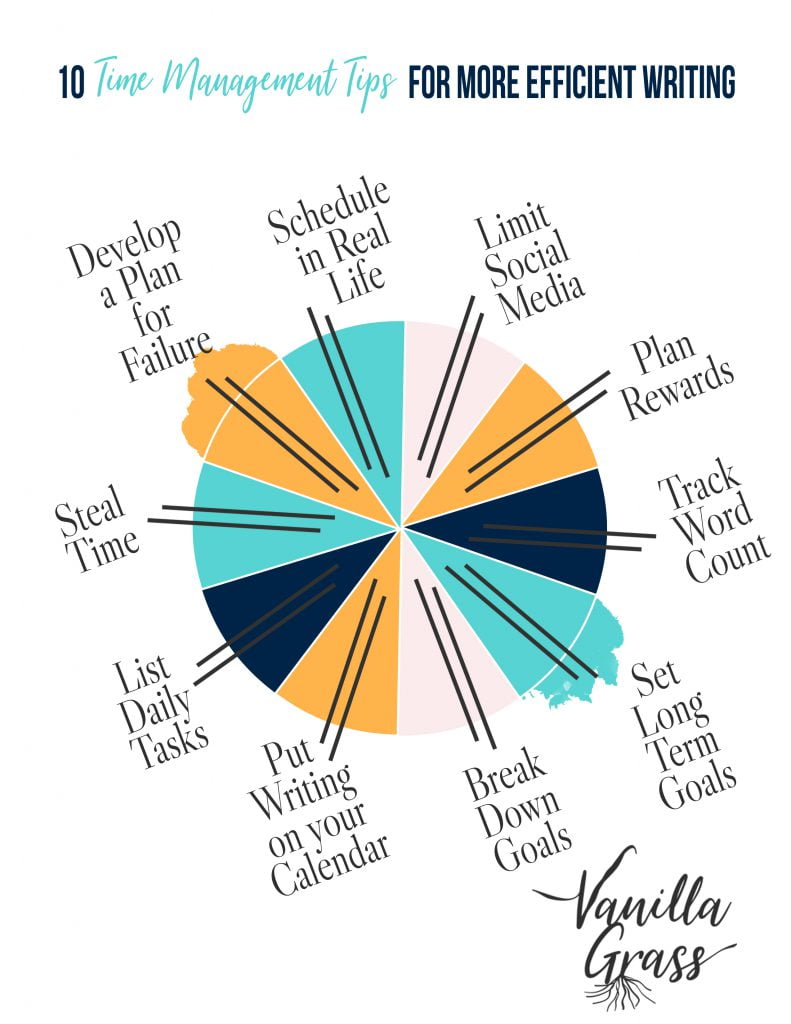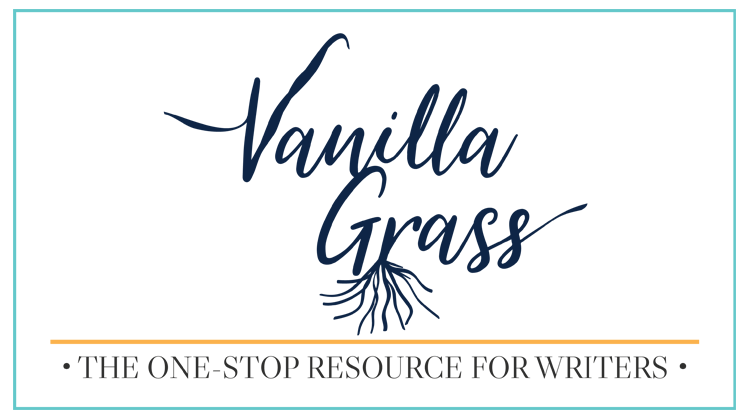Efficient time management can be the difference between an “I’ve always wanted to write a novel” writer and a famous author. Read ahead for the one-stop writing resource on time management tips for efficient writing.
THE LIE WE TELL OURSELVES

“I don’t have enough time.” I would bet you my last Swedish Fish that you’ve said that at some point.
If you were to poll all of my neighbors, friends, and family, 99% would list me as the most organized, productive person they know. My house is clutter-free, there are labeled freezer meals in the fridge with a menu plan, and I even bought and wrapped all my Christmas presents back in June.
Am I an organizing superhero? No, actually the opposite.
I have ADHD and the same amount of time as you.
Two months ago, I was diagnosed with childhood ADHD that has carried on into my adult life. According to Peter Jaska, Ph.D., adults with Attention Deficit Hyperactivity Disorder suffer from “severe and chronic disorganization.” So if I could learn to be organized and better utilize my time with every neuron in my brain against me, you can too. All it takes is a trusted guide and a little passion on your part.
If you have dreams, but struggle to make them tangible, you’ve come to the right place.
Time Management Tip #1: SCHEDULE IN “REAL LIFE” AND FUN
Have you read that best-selling novel from the hermit who writes for 18 hours a day?
Me neither.
And we never will because a hermit without any interactions or life experiences won’t be able to craft a story that people can relate to. Writers tend to extrapolate what they know. If you don’t have a life outside of writing, the characters in your book probably hate you for making their lives lame.
You can argue that Castaway with Tom Hanks is a hermit story. But I counter with Wilson, and primal survival needs, and tragic love.

I will grant you a pardon if you meet the following qualifications:
- You have a rare disease that allows you to hallucinate into the future.
- You have a bomb strapped to your butt.
- And the fate of twenty-seven orphans from Montenegro rests on your ingenuity and ability to write for eighteen hours a day.
For the rest of you–get out and live. If you have zero interests, pretend you do. If you don’t have friends: people watch. Go on vacation. Get a little sun–unless you have Lupus. And experience life so the rest of us can gain insights when we read your book. Research shows you’ll be more effective when you enjoy the world around you–win-win.
What do the clouds taste like on top of the Alps? How does the heat feel on your body when you’re in the Australian Outback? What reaction do you get when you give someone a million dollars?
Maybe you can’t afford those things, but you could hike up a hill or a mountain near you to feel the clouds. Or you could exercise in the hot summer sun to describe an experience like Crocodile Dundee’s. Or try giving a stranger ten bucks, and see what happens.

If you want to write realistic stories that will grip the attention and heart of your readers, then give yourself ample opportunities to experience life. Joy. Heartaches. Love. Tragedy. Friendship. Food. Adventure. Your potential readers want it all.
When you fill your well, you’ll have more to give and more motivation to share. And learning how to be a better, more efficient writer will come easier to you.
Time Management Tip #2: LIMIT SOCIAL MEDIA
Who hasn’t struggled with managing social media, or the constant dings from texts or emails on our phones?

When I took a break from Facebook and set my phone on do-not-disturb, I went from writing a 75,000-word novel every 6-12 months to writing one every 2-3. And my quality significantly improved.
Try setting your phone on silent or turning off the internet while you type. Or start a timer for thirty minutes or a few hours and leave your distractions in another room. You could even try programs like Calmy Writer to help you focus and improve your efficient writing skills.
Time Management Tip #3: PLAN REWARDS
Some of you may need rewards to motivate your body to sit in front of a keyboard. Others–like me–need incentives to stop typing and go make dinner already.
Find ways to congratulate yourself for working toward your goals with treats or guilty pleasures.

My treat faves: Swedish Fish and popcorn.
Carolyn’s: almonds, carrots, strawberries, and cookies.
My guilty pleasures: silence, listening to music, old-school Heroes II
Carolyn’s: Binging a book in one day, Korean dramas (don’t judge!)
Time Management Tip #4: TRACK WORD COUNT
Whether you are writing or editing, tracking your word count is invaluable for motivation and setting goals. To effectively plan, you need to know your capabilities.
First, block out a little over an hour.
Second, turn off/lockout all distractions (phone, social media, kids, spouse).
Third, set a timer for two to five minutes and plan what you’re going to write or what to edit. Even if you’re a pantser, shooting toward an end goal in a chapter or scene can focus your writing and reduce drastic changes later. And if you’re revising, developmental and line edits should take place separately.
Fourth, mark where you started. If you’re already in the middle of a project, write down your word count. I’ll show you below where I keep mine in Scrivener.
Fifth, set a timer for 60 minutes and go. Some people suggest that you just free write without any re-reading or editing. That doesn’t work for me. If I zoom through and don’t pay enough attention to my sentence structure or flow, I’ll usually end up scrapping the whole thing. Or try four blocks of 15-minute sections without lifting your fingers from your keyboard. Figure out a writing pace that works for you.
Sixth, subtract your starting word count from your ending total. This number will give you an idea of what you’re capable of. If you want to get more specific, try this exercise for a week and calculate the average.
Since I’ve been writing and tracking for years, I usually reach 3,000 words written and edited for flow in 3-5 hours. My favorite place to record progress is in Scrivener under project notes, but sometimes I save it in Google Keep.
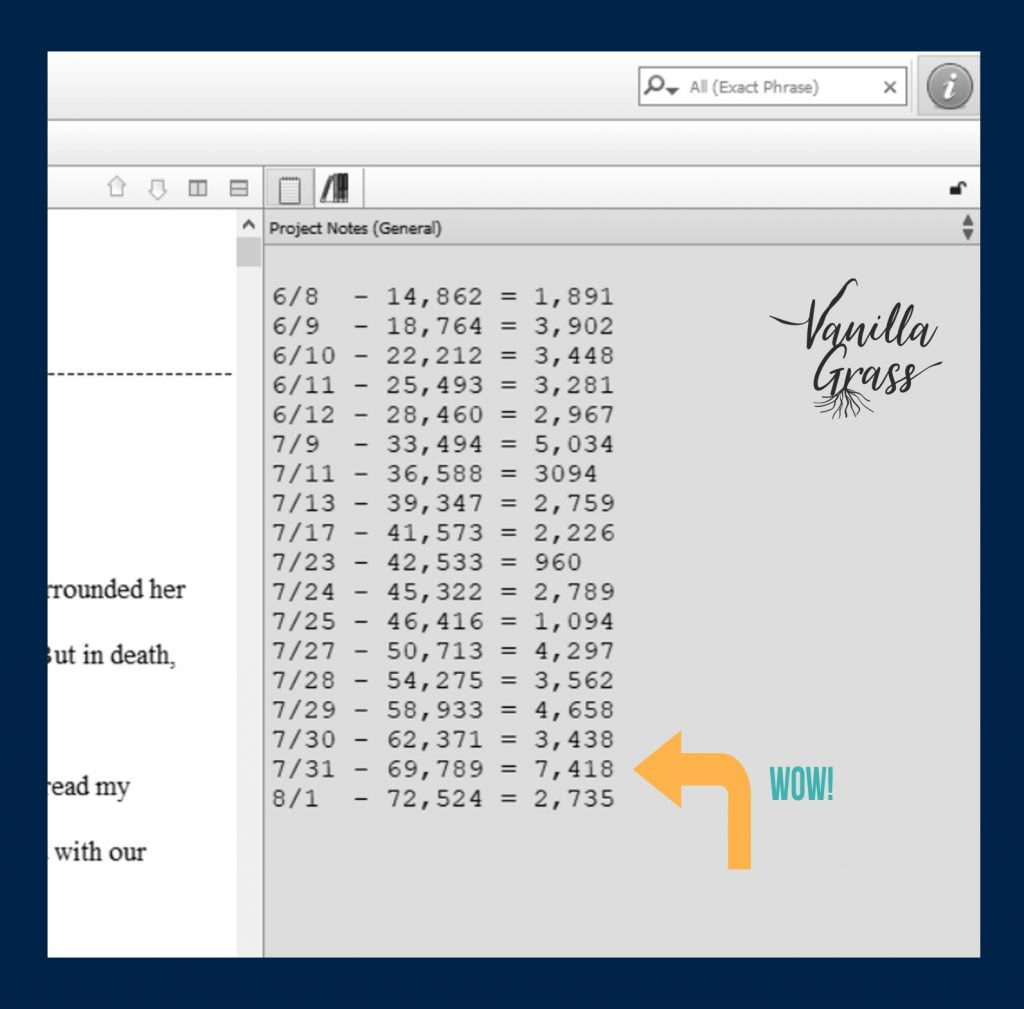
Time Management Tip #5: SET LONG-TERM GOALS
According to Psychology Today, goal-setting increases motivation and can help you achieve greater heights. And I couldn’t agree more when it comes to efficient writing.
Wherever you’re at in the writing process, there’s a goal bouncing around in your head. Maybe you want to write “The End” in a rough draft, or publish your tenth book, or reach the New York Times’ bestseller list. Perhaps you have a blank page, and fear of the unknown is holding you back.
The most effective way to reach your dreams is to acknowledge what they are.
So dig deep, think of that goal, and write it down on a napkin like J.K. Rowling, or on Google Keep like me. You could email it, text a friend for accountability, or carve it into a tree–on your property, not on someone else’s.
Is your goal recorded and tangible?

Great, now we need to come up with a reasonable time frame to finish your goal. It can help if there is an external event driving you like an upcoming PitMad, Nanowrimo, or writing conference.
My current goal is to finish editing my rough draft before my upcoming surgery, so my followers don’t lynch me. I’ve left them hanging at the midpoint…
No pressure.
Time Management Tip #6: BREAK DOWN GOALS
If your goal is to write a 75,000-word novel in four months and you type an average of 500 words an hour, five days of the week, you’ll need to write about two hours a day.
Here’s the calculation:
Target word count, divided by words per hour = hours needed.
Hours needed, divided by the number of available days = hours per day.
Did I lose any right-brainers out there?
If that calculation doesn’t work for you, then come up with a way to divide your goal into manageable portions. Maybe it’s one chapter a day, or 5,000 words a week–whatever works for you. Until you can see your dream as possible, chances are you’ll keep procrastinating. But no matter where you’re at right now, you can develop efficient writing skills.
Time Management Tip #7: PUT IT ON YOUR CALENDAR
If you’ve read this far, your writing is important to you. So important, that your goals should be penned into your calendar. Don’t use wimpy pencil marks–make it permanent.
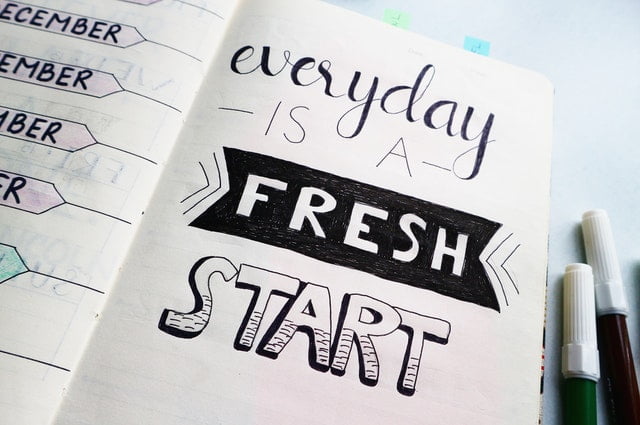
But what if–
Yeah, life happens, and it will overshadow your writing every day if you let it. And those days add up to months and years of, “I want to write, but I’m just too busy.”
You’re never too busy for the things you do every day, but if you let tasks dominate, you won’t fulfill your inner desires. And when that happens, you’ll find yourself blending in with the floral pattern of your great aunt Mabel’s couch at the next family gathering.
What you need is balance. What you need is an OCD organizing guru to guide you with the perfect time management spreadsheet. Luckily, you have exactly that, so keep on reading.
Time Management Tip #8: LIST DAILY TASKS
With a goal penned into your calendar, rewards planned, life in the works, and social media off, you’re ready to enter my OCD organizational rabbit hole. Managing your time is impossible until you understand how you use and waste it.
If you’re brave, click here for a Google Sheet that you can copy to calculate how you spend your days.
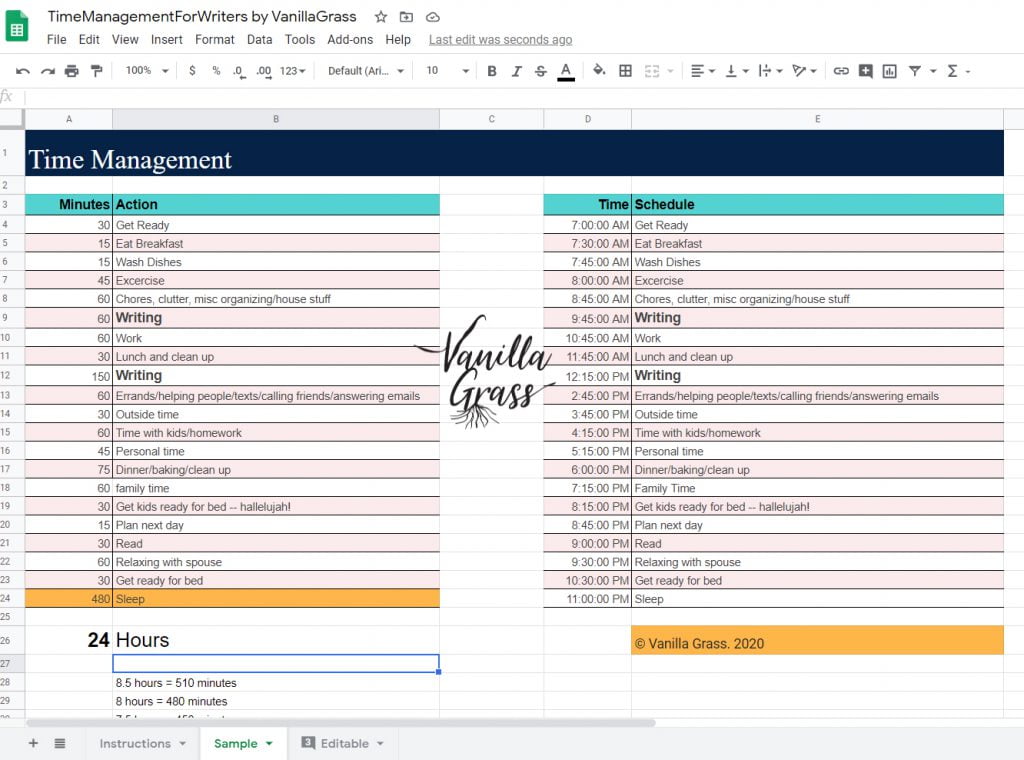
First, you’ll write down everything you have to do in your day. Mine includes things like boring chores and errands. But I also have time to read, exercise, get outside, and relax with my husband and kids. And you can be sure I have blocked out time to write.
Second, you’ll estimate how long those things take. When you’ve balanced your life, the calculations will add up to 24 glorious hours.
Then, you’ll put in your wake-up time, and the sheet will spit out a daily schedule. Adjust until it’s perfect. Use your rewards to stick to it, and when the unexpected removes chunks of time, tossing minutes or hours into the void–keep moving forward.
Every day is different. Tomorrow might be perfect even if you only managed to use the bathroom and shove food in your face today.
Time Management Tip #9: STEAL TIME
Okay, you can never have more than 24 hours in your day. But there are potential pockets of useless minutes that you can monopolize for writing or plotting.

Do you ever have to wait in line or at a doctor’s office? Steal it for your craft. And no, you don’t have to lug your laptop everywhere. Try the following ideas to maximize your time:
- Take a pen and paper and brainstorm more ways to torture your character.
- Put the last few paragraphs of your work-in-progress on a Google Doc or Google Keep Note and edit the heck out of it, making it all shiny and beautiful.
- List out as many details as you can of your upcoming scenes. Write some descriptions or dialogue. Extra points if you say the conversation aloud while you type on your phone in a busy waiting room.
- Research writing topics to improve your writing.
- Research items for your book that you’ve been putting off.
Time Management Tip 10: DEVELOP A PLAN FOR FAILURE
I wowed you at the beginning with my mega-organizing skills, and you’re probably thinking I have at least three-hundred bestsellers.
Wrong.
No matter how much I plan, life happens. In February 2020, I had a goal of writing my next book by the end of April and pitching it at Storymakers in May. Little did I know (any Stranger than Fiction fans?), that the pesky coronavirus would dump all of my children in my lap all day.
Every day.
But I’ve had plenty of failures and setbacks before, so I set new goals to finish my rough draft in June. Scratch that–July. And then my health tanked, and the doctor recommended surgery (someday I’ll write about life with auto-immune diseases and too many allergies). With everything against me, I set two possible goals: one before my surgery, and one far-after.
You read moments ago about my goal to finish early. I wrote that section of this post two weeks ago, and since then, I have completed my rough draft. Six of my followers have already read and given me the green light.
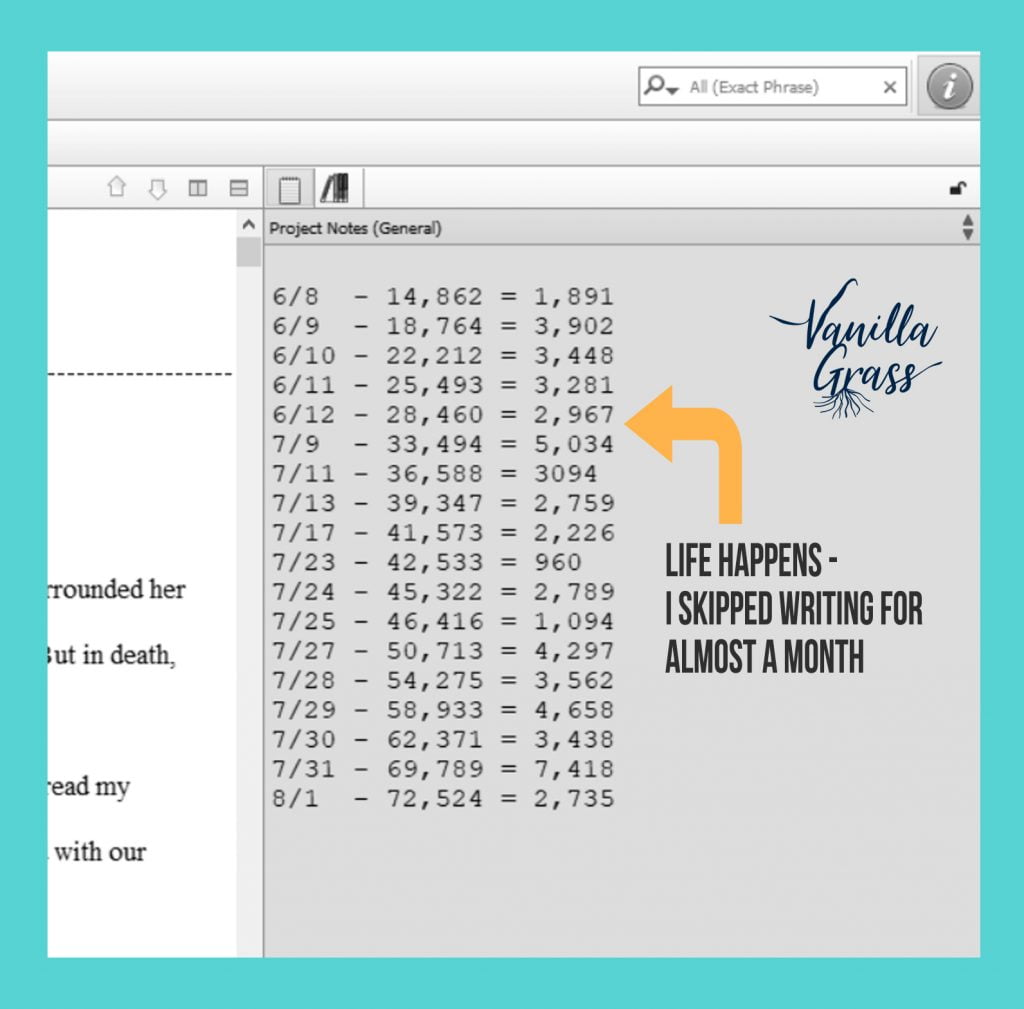
My rough draft is far better than the one I would have written at the end of April or June. Life experiences gave me more perspective, and my plots had more time to simmer.
All of my writing, even the horrible stuff that no one will ever see, has helped me get to where I am today. Steven Tyler of Aerosmith says, “Dare to Suck,” and I agree.

Failure is one of our best teachers. Failure is our friend.
Because when we keep reaching higher despite our fears, eventually, we’ll make something amazing that is worth all the heartache, and late nights, and empty bags of Swedish Fish.
So the moral of this mini, personal story is to encourage you to keep digging deep. We all have the same amount of time, but when you learn to bend it to fit your life and needs, you’ll keep moving toward your dreams, even when life comes at you with nunchucks wearing size fourteen heels. (Thankfully, I haven’t had that one yet.) So print off our handouts, set some goals, and maximize these efficient writing strategies.
